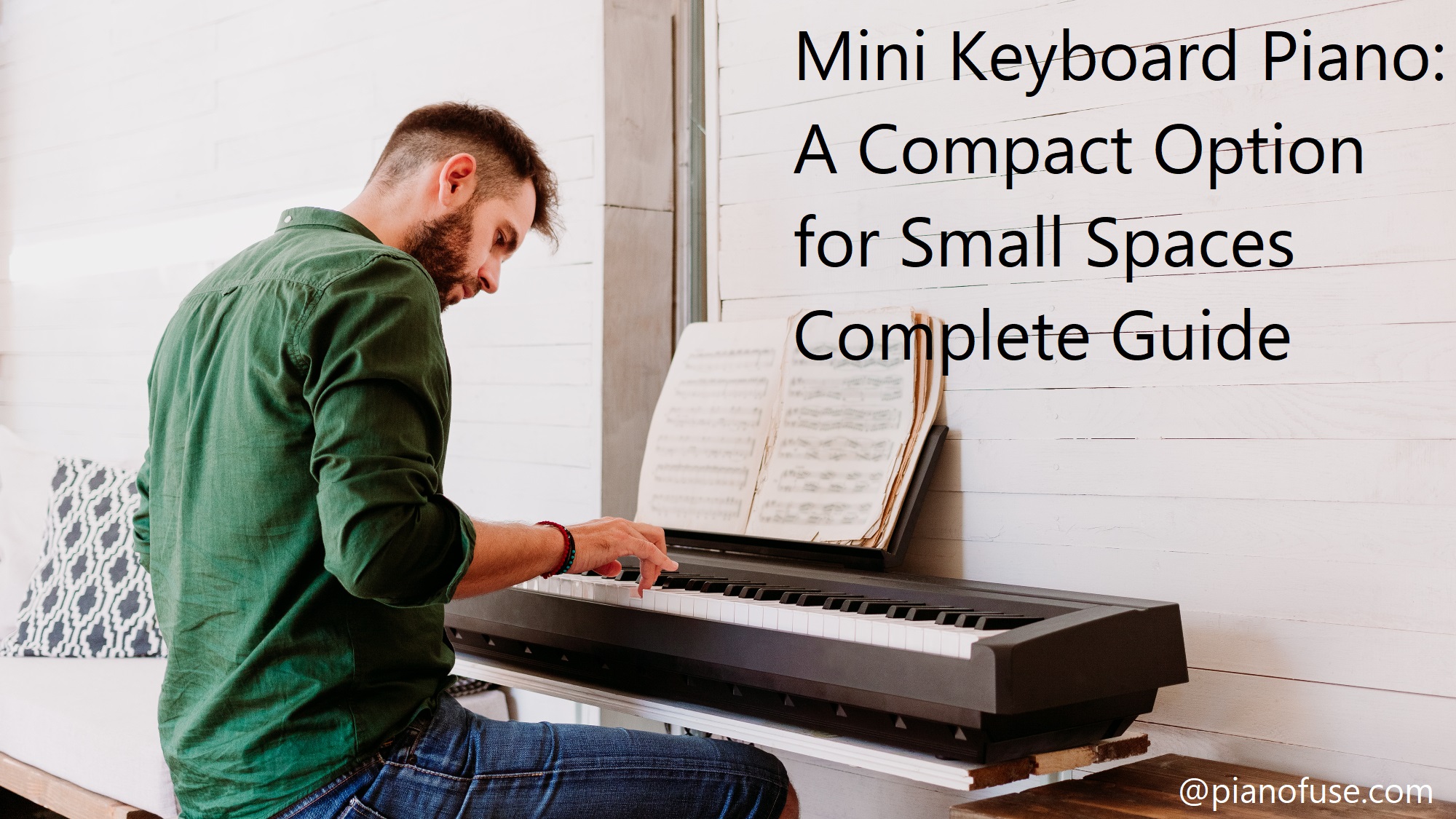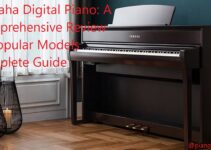Are you a music enthusiast looking for an affordable, space-saving piano? Look no further – the mini keyboard piano is the perfect option for you!
Compact and portable, this instrument can provide hours of entertainment without taking up much space. Read on to learn more about this convenient instrument and how it can fit perfectly into your lifestyle.
Are you looking for a way to bring beautiful music into your home without giving up valuable square footage? Consider getting a mini keyboard piano! Mini keyboards provide an excellent option for those who want to learn music but have limited space or budgets. This guide will provide you with all of the information needed to determine which mini keyboard is right for your needs, as well as provide tips and tricks to help you get the most out of your experience with it.
Mini keyboards are smaller than their full-sized counterparts but have just as much power and sound quality. They range from small, portable varieties that can easily be carried around town in a backpack to larger ones that offer more features and sounds. Most come with illuminated keys, built-in speakers, recording capabilities, and even the ability to connect to computers or tablets. Whether you want an instrument suitable for learning how to play or one that provides professional-level sound, there is sure to be a mini keyboard piano that is right for you!
This complete guide will outline what features are available on different models of mini keyboards and provide advice on how best to use them. After reading through this guide, you will be prepared to select the perfect mini keyboard piano and begin your musical journey today!
Explanation of what a mini keyboard piano is
A mini keyboard piano is a type of electronic piano which is designed to occupy less space than a standard full-sized piano while still providing the same quality of sound and playability.
Mini keyboards typically contain fewer octaves, but have made major strides towards providing digital pianos with all the features found on larger models. This includes an array of digital effects, functions and voices that can be readily switched between.
They also often have greater portability due to their smaller size, use low voltage power meaning they can be used outdoors and are easily transportable.
Mini keyboard pianos are available in both analogue (which require physical contact) or computer based digital formats making it possible for musicians to practise and develop as if they were playing on a traditional full sized instrument in a practice or recording studio environment.

Benefits of a mini keyboard piano
Mini keyboards come in a variety of styles, shapes, and sizes. They range from low-end models to higher-end versions. For people who are interested in playing piano but have limited space, a mini keyboard piano is the perfect solution. It offers many benefits compared to a full-size piano.
The main advantage of using a mini keyboard piano is the sheer portability. These instruments weigh significantly less than traditional pianos and take up much less space when fully assembled. This can be especially helpful if you need to move your instrument frequently or if you only have limited space available in your home or studio. It also makes them easier to transport, which can be extremely convenient when travelling with your instrument or if you’re attending classes or lessons away from home.
Another benefit of owning a mini keyboard piano is that they tend to be much more affordable than full-size pianos, making them an attractive option for those who are just beginning to learn the instrument and do not want to expend too much money right away. Mini keyboards often boast extra functions such as rhythm tracks and various sound effects that may not be available on larger models, giving you more options for creating new sounds and exploring different genres of music. Some even feature built-in speakers for added convenience. Finally, many mini keyboards come equipped with headphone jacks so you can practice without disturbing others around you.
Features to Consider
Choosing the right mini keyboard piano for your needs involves looking closely at the various features that are available. These include:
Size: A mini keyboard piano usually has between 25 and 61 keys, sometimes more. The smaller keyboards are lighter and more compact, while the larger ones offer more range when playing complex musical pieces. It’s important to consider the physical size of your space and determine which option will be most practical.
Weight: Mini keyboards typically weigh anywhere from 2-13 pounds (1-6kg). Light models are better for portability, but you need to balance this with the desire for it not to be too flimsy or fragile.
Touch/Feel: Different instruments have different touch sensitivity settings for how hard you need to press on a key for a sound to be produced. You may also look out for weighted keys, which mimic an acoustic piano in terms of how much pressure needs to be applied. This can help develop proper technique.
Number of Octaves: A full-sized keyboard has 88 keys but minis can have as few as 25 keys spanning just one octave in range. Generally, the ideal number of octaves depends on personal preference – a 61-key model should provide enough range if you plan on playing mainly melodies and chords rather than large scale pieces written for a grand piano.
Voices/MIDI Connectivity: Many mini keyboards come with pre-set voices that imitate other instruments like strings, organs or trumpets – perfect if you are looking for diversity in sound effects or tones.. Some advanced models also have MIDI connectivity so that they can control standard music production software (DAW) and act as a controller when producing electronic music ; this is especially useful when recording audio in a home studio setting .
Key size and weight
Mini keyboards usually range from 25 to 37 total keys. Their width is usually between 11.5 and 13 inches, making them difficult to accommodate on a standard desk. Even when folded in half, mini keyboards are typically too wide and long for comfortable transport in a backpack or briefcase.
However, key weight varies widely with mini keyboards—some models provide a piano-like feel, while others strive for portability and sacrifice any sense of resistance in the keys. If you’re looking for the full experience of playing a grand piano without having one in your home or carrying one around with you, look for a keyboard that offers good weight resistance on the keys and realistic feel as you play.
Touch sensitivity
Touch sensitivity refers to a keyboard’s ability to mimic the dynamics of acoustic instruments. When a key is pressed, touch sensitivity characteristics like power, velocity, and aftertouch will provide a musician with more expressive control over their sound. With touch sensitivity, pianists can create subtle nuances that would not be possible using standard keys. Those looking for realistic sound and feel should choose a keyboard with touch sensitivity.
The touch sensitivity of a mini keyboard piano can vary widely depending on its size and price range — less expensive keyboards often lack touch sensitivity entirely. Those interested in purchasing one should read reviews carefully as some manufacturers may advertise high-level features that don’t actually exist in their products. Additionally, more expensive models will usually feature different levels of touch sensitivity — from fixed (non-variable) to multi-velocity layers — allowing for further emotional nuance in performances.

Polyphony
Polyphony, or the number of notes that can be played simultaneously, is an important aspect to consider when selecting a mini keyboard piano. Any instrument with 32 or fewer notes of polyphony is considered a low-end keyboard and is not likely to be able to produce complex pieces of music. Instruments with 64+ notes of polyphony are typically considered mid-level or higher level keyboards and allow for more versatility in what you can do musically (including chords, modulations, and so on). Professional grade pianos will have 128+ notes of polyphony.
It is important to understand that higher polyphony does not equate to better sound but rather more sound complexity.
Built-in sounds and effects
Mini keyboards come with lots of built-in sounds and effects to provide an enhanced playing experience. You can easily choose from different instruments or preset sound kits to get creative with your music making sessions.
Some mini keyboard models, like the Alesis V25, offer hundreds of instrument, drum and percussion sounds to explore. This type of all-in-one synthesizer provides a great way to practice without the expense of purchasing various instruments or a full-sized keyboard.
Other features you might find on some mini keyboard pianos include chorus effect for added depth and texture and pitch bend for creating unique musical passages, as well as modulation wheels for adding vibrato or whammy effects to your playing.
Connectivity options
A mini keyboard piano is an ideal instrument choice for small spaces with limited storage space and transport options. Most acoustic pianos come in large sizes and are bulky and costly, while keyboard pianos can come in a variety of sizes. When it comes to mini keyboard pianos, they are even more compact than traditional keyboards. Mini keyboards have a limited number of keys but still feature full-sized keys, weighted keys, and velocity-sensitive action for an enjoyable playing experience. Furthermore, these types of instruments can connect to external devices via various connectivity options to add extended capabilities.
Here are some of the common connectivity options that you might find on a mini keyboard piano:
MIDI: MIDI stands for Musical Instrument Digital Interface, which is the most common type of input/output connection available on most keyboards (including mini ones). MIDI connections allow you to connect your instrument to computers or digital music workstations (DAWs) so you can record your performance or sync other instruments with yours.
USB: Some mini keyboards come with built-in USB ports so you don’t need a dedicated MIDI interface to get your instrument connected to the computer. This makes recording music with your mini keyboard much easier since no additional hardware is needed — just plug it in with a USB cable and you’re good to go!
Audio Jacks: A few models also feature separate audio jacks so that you’re able to deploy two independent outputs from two separate sources in one device – for example sending one audio signal through speakers and recording another on a DAW or other external device by using two distinct audio outputs from the same instrument at once.
Portability
If you’re looking for a portable option in keyboards, Mini Piano keyboards could be the perfect choice. These models are packed with features and have the same sound quality of larger units but can be conveniently folded to make them easy to transport. This makes them an ideal choice for small spaces, students, or anyone looking for a great keyboard experience without sacrificing flexibility and portability.
Other benefits that make these units so popular include their light weight and low power consumption. It means they won’t take up much space or drain your energy source quickly, so they’re great if you just need something to practice with at home. Additionally, many models come with built-in speakers that provide excellent sound even in small rooms or when using headphones.
When considering a mini keyboard Piano unit, one major factor to consider is size. This can range anywhere from 25 keys up to a full 88-key model—make sure you opt for something that offers the number of keys appropriate for your needs. Additionally, mini keyboard pianos often contain additional features such as arpeggios, drum sets and pre-recorded chord progressions which offer more options when recording and composing music if desired.

Conclusion
A mini keyboard piano provides an ideal solution for people with small living areas who still wish to have the benefit of playing the piano. Mini keyboards come in a variety of sizes, styles, and features to suit individual needs. They often have full MIDI features so they can play different sounds as well as connect to digital recording devices, laptops or computers. Depending on the type and design it can be a useful companion for travel or make a great edition to your home setting.
Mini keyboard pianos typically offer fewer keys than a traditional piano but may be just what you need if you want the convenience of size for small living areas or portability when you travel. Many top manufacturers now offer quality mini instruments that are equipped with many advanced features. No matter how experienced a musician is, from novice to professional these instruments usually come with various functions that can help bring out their own personal style in their performances.
When selecting which one is best for you consider all factors from price range, style of sound, portability and other special features that may be available such as built-in speaker technology or headphone jacks for silent practice sessions. With right selection and care your mini Keyboard piano could last a lifetime of loyal performances!
FAQ’S
What is the smallest mini piano?
The smallest mini piano available may vary by brand and model, but generally, mini pianos are smaller than traditional pianos and have fewer keys.
What is a mini piano keyboard called?
A mini piano keyboard is often called a portable keyboard or a digital keyboard.
What is the best mini keyboard piano?
The best mini keyboard piano may depend on personal preferences and needs, but some popular brands include Yamaha, Casio, and Roland.
How do you put a piano in a small space?
To put a piano in a small space, consider the size and weight of the piano, and the available space. You may need to disassemble the piano or use a piano dolly to move it.
Can you learn piano on a mini keyboard?
Yes, you can learn piano on a mini keyboard, but it may have some limitations due to its smaller size and fewer keys compared to a traditional piano.
Can you learn piano on a mini piano?
Yes, you can learn piano on a mini piano, but it may have some limitations due to its smaller size and fewer keys compared to a traditional piano.
What is the size of a mini piano?
The size of a mini piano may vary by brand and model, but generally, it is smaller than a traditional piano and has fewer keys.
How big is a mini piano?
The size of a mini piano may vary, but it is generally smaller than a traditional piano and has fewer keys.
Are small pianos heavy?
Small pianos may still be heavy, depending on the materials used and the number of keys.
See Also:
- Best piano mic 2023
- Best portable digital piano 2023
- Best portable piano keyboards 2023
- Best upright piano 2023
- Best yamaha digital piano 2023

